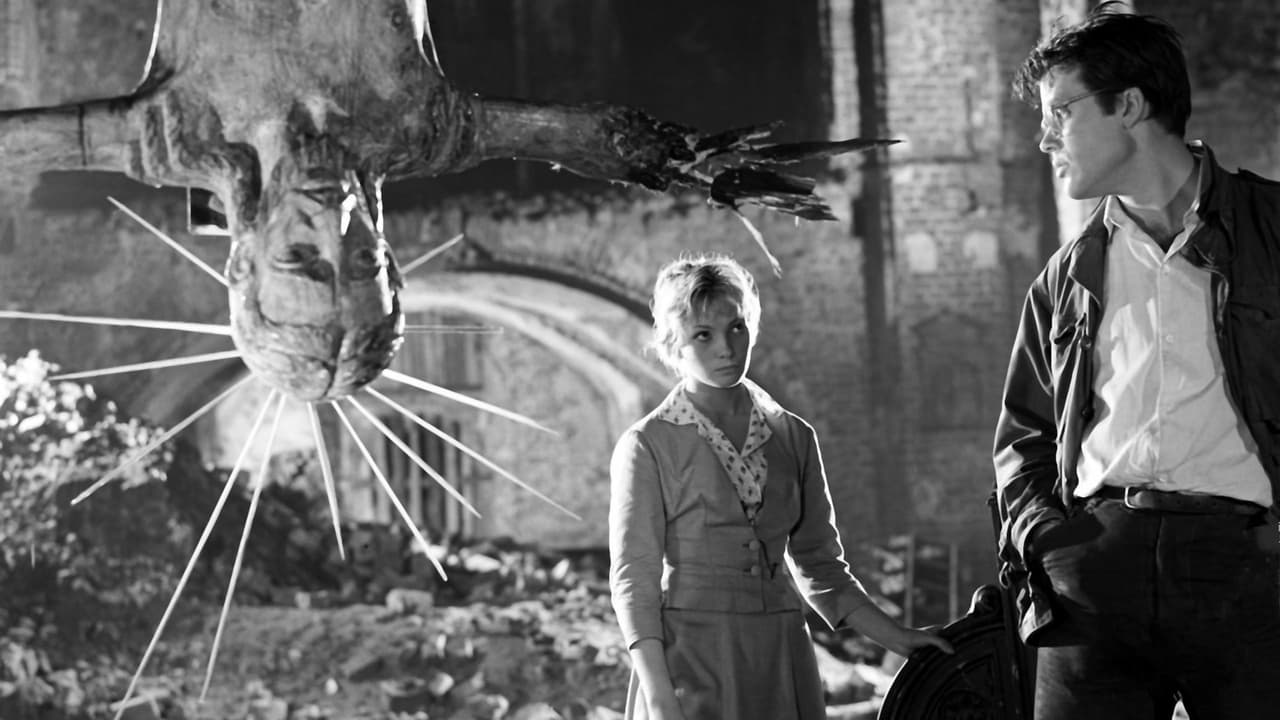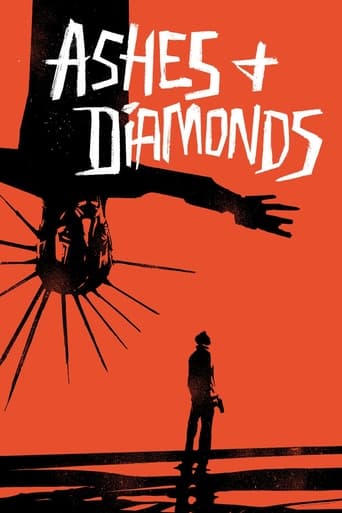Spoonatects
Am i the only one who thinks........Average?
Dynamixor
The performances transcend the film's tropes, grounding it in characters that feel more complete than this subgenre often produces.
Tayloriona
Although I seem to have had higher expectations than I thought, the movie is super entertaining.
Sanjeev Waters
A movie that not only functions as a solid scarefest but a razor-sharp satire.
Turfseer
If Marty Scorsese tells you that 'Ashes and Diamonds' is one of his favorite movies, it's likely that many will accept his viewpoint without a critical eye (that is the power of the influential American auteur, Mr. Scorsese). Of course it's easy to understand why Scorsese is enamored with the film, mainly due to the 'Citizen Kane-like' cinematography and all those brilliant little 'cinematic' moments (such as the film's iconic ending where anti-hero Maciek is shot and ends up in the fetal position, on a trash heap). But despite the cinematic style that Mr. Scorsese so adores, one cannot ignore the reality of the time in which the film was made and the compromises director Andrzej Wajda was forced to make.Ashes and Diamonds was released in 1958 and the English translation version in 1962. Poland of course was under the thumb of the Soviets and to give director Wadja the benefit of the doubt, he was in no position to make a film that was critical of the Communists who were ruling Poland at the time. Thus, Szczuka, the Commissar who returns to Poland on VE day (May 8, 1945) and who is the subject of an assassination attempt by Home Army operatives at the beginning of the film, must be depicted as a wholly sympathetic figure who has the best interests of the Polish people at heart. Szczuka is also a tragic figure, who, at the moment he's on his way to re-connect with his son (a captured Home Army sympathizer who was raised by an anti-Communist aunt), is unmercifully cut down by Maciek.What's missing here in this film is political context. Sure there may have been well-meaning 'patriots' such as Szczuka amongst the Communists but what about the dark side of Communist rule? The Polish Home Army was the largest resistance group against the Nazis during World War II. The group was officially disbanded even before the end of the war in January 1945. A deal was made for thousands of former Home Army soldiers to receive 'amnesty' by the Soviets, but instead, after they accepted the amnesty deal, they were rounded up and sent to Soviet gulags, many never to be seen or heard from again. None of this important information, makes its way into the film.Instead, Wadja, introduces a stock villain in the form of 'The Major' who was responsible for ordering the assassination of Szczuka, but instead finds himself responsible for the murder of two innocent factory workers. Both assassins, Maciek and Andrzej, appear to be trapped (in Wadja's view) by bad karma. Andrzej asks the Major whether it's really necessary to kill Szuzuka, but the Major won't entertain his question. And of course, Maciek, the brooding loner (modeled on James Dean), falls in love with a bar girl, but ultimately can't run away, and goes through with the murder of the kindly apparatchik.Most of the plot revolves around a banquet given for the local mayor in a hotel. While this is happening, the plot to kill Szczuka slowly materializes as the backgrounds of each of the prinicipals is introduced. While the sub-plot involving Szczuka's son is somewhat interesting, Wadja (due to the constrictions of the time) is not permitted a Szczuka counterpart—one who shows the dark side of Soviet influence. As previously mentioned, the Major is too Machiavellian, without showing any of the other side's good points. And despite their 'sensitivity', Maciek and Andrzej, end up as ruthless as their commanding officer.Perhaps Wadja's most interesting character is Drewnowski, the informant who loses his job in the mayor's office after becoming completely intoxicated. Drenowski perhaps represents the 'common man', tragically caught between the two warring factions in Polish society at the time, and unable to cope.Ashes and Diamonds may have represented some kind of breakthrough for Polish cinema at the time it was released. Here, opponents of the ruling Communist government, are treated with some sympathy, as victims of some kind of inevitable and hence, tragic karmic law. Nonetheless, Wadja must ultimately throw the opponents of the ruling regime, under the proverbial bus. A more nuanced and clearer picture of these opponents, would ultimately appear, following the fall of Communism. Scorcese is right in heaping accolades over Ashes and Diamond's style; but its 'substance' is decidedly dated: stuck in a time, when people had to continually self-censor thoughts and words which they wished to say.
Michael Terceiro
I watched the Wadja War Trilogy back to back, so you can imagine I was looking forward to the final instalment which is generally considered to be the best of the three. However, I was quite disappointed. The reason for my disappointment was because O felt the lead character was trying much too hard to be a Polish James Dean. The only difference being that the odd things James Dean used to do when he was acting, didn't seem weird out of place. Unfortunately, you don't get the same feel from the weird things that the lead in Ashes and Diamonds keeps doing throughout this movie. Even the final scene seems to me to be quite strange and almost comical.Having said that, the plot is great and Wajda does a great job capturing the atmosphere of confusion which must have existed in Poland on the last day of the war. Nationalists and communists were no longer fighting a common foe in the Nazis - rather they were now fighting each other for the right to rule Poland. Despite my reservations about the lead character, this is still worth watching. Given the other reviews I have read about this movie, I am clearly in a minority in my views about the lead character.
ackstasis
During WWII, two ideologically-opposed factions, the London-directed Home Army and the pro-Soviet People's Army, joined forces to defeat a common enemy, the Nazis. When the war came to an end in May 1945, however, so too did the groups' shaky alliance, and from momentary peace was suddenly sprung a whole new struggle for power. While a new Communist regime began to build its foundations in the shell-shocked Polish cities, the remaining Home Army rebels took to the forests, where they dutifully continued their liberation campaign using guerrilla tactics. If WWII itself is considered necessary – or, if not necessary, then at least justified given the Nazi menace – then this post-War skirmish is the ultimate waste of life, prompting murder on the grounds of mere ideology. In Andrzej Wajda's 'Ashes and Diamonds (1958),' a weary Home Army youth, Maciek (Zbigniew Cybulski), faces an internal conflict between fighting political causes and living a normal life, not coincidentally the same dilemma facing the nation of Poland as the War came to a close.Wajda's film opens with an cold-blooded ambush, in which two concrete factory workers are needlessly gunned down in a case of mistaken identity. These shootings take place at the front steps of a country chapel, and with a child within earshot, highlighting the heartless resolve with which the Home Army rebels carry out their murders. However, despite the pro-Communist climate in which Wajda produced his film, he stops well short of demonising the "enemy" rebels, and, indeed, young Maciek is portrayed as the tragic victim of the story. In fact, the film goes to some length to emphasise the parallels between Maciek and Communist leader Szczuka (Waclaw Zastrzezynski), implying the needlessness of their conflict, and so the tragedy of their fatal opposition: both men fought valiantly against fascist dictatorships (the former in both Spain and Poland), and remember fondly the war comrades who died in pursuit of an ideal that, to both, should now be deemed realised. Instead, Szczuka dies in Maciek's arms as Poland celebrates its liberation.Polish cinema reached its peak in the late 1950s, following the Khrushchev Thaw that saw an ease in Soviet censorship, and Andrzej Wajda was at the forefront of this cinematic New Wave. Jerzy Wójcik's stark black-and-white cinematography is elaborate and beautifully-executed, capturing the main character's claustrophobic isolation using closed sets and a cramped frame. The war itself took many prisoners, but Maciek – ironically a "freedom fighter" – finds his freedom restrained in a less overt manner. Even with the liberation of Poland, Maciek is obligated to continue his blood feud, denied the ordinary happiness offered by a life with pretty bar-maid Krystyna (Ewa Krzyzewska), with whom he spends a night. Cybulski's character squanders most of the film in boisterous, overcrowded surroundings, finding room to move only in fractured moments, such as a late-night stroll through the crumbling town ruins. Even in his death throes, Maciek stumbles through a cluttered wasteland of garbage, ultimately joining the detritus of the twentieth century's most costly conflict.
Lee Eisenberg
At its most basic, Andrzej Wajda's "Popiol i diament" (called "Ashes and Diamonds" in English) may seem to be a look at where Poland would be going after WWII ended. The plot involves young Maciek Chelmicki (Zbigniew Cybulski), who has helped expel the Nazis from Poland. With the Soviet Union now taking over the country, he is ordered to shift his allegiance to them. Through Maciek's acquaintances with communist leader Szczuka and barmaid Krzystyna (Ewa Krzyzewska), a potentially explosive situation arises.If you know nothing about how the movie got made, this seems to be the whole purpose. But there are other points. In a mini-documentary about the movie, Andrzej Wajda and his collaborators explain how the novel on which the movie is based had Szczuka as the main character. Wajda not only moved the focus to Maciek - and gave him sort of a James Dean look - but also stressed the scene where Maciek talks with the man who fought in the Spanish Civil War. Apparently, fighting like the man did is a Polish tradition. Therefore, the film likely appeals to the Poles in almost every way; the perfect Polish movie, if you will.Although I've never seen any of Andrzej Wajda's other movies - hell, I'd never heard of him until the Academy Awards gave him an honorary Oscar - I staunchly recommend this one. One can clearly see how he used the movie to subtly challenge the Soviet domination of his country (of course, they couldn't openly say anything against the USSR). Poland's pro-Soviet government had approved the movie, but didn't want to let it outside Poland. Wajda got some people to smuggle it out of the country, and it reached much of the world. Probably the most amazing scene is the end. I won't spoil the end, but I'll note that blood on a white sheet looks a bit like Poland's flag (a nationalistic statement).All in all, a great movie. Andrzej Wajda has every reason to be proud of it.

